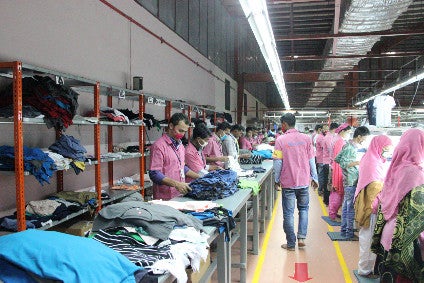
The functions of the Bangladesh offices of the Accord on Fire and Building Safety in Bangladesh have transitioned to the RMG Sustainability Council (RSC), a permanent national safety monitoring and compliance body for the country’s ready-made garment (RMG) sector.
Officially registered in Bangladesh on 20 May, the RSC is a not-for-profit company created and governed by a board of directors consisting of an equal number of representatives from RMG manufacturers, global apparel companies, and trade unions representing garment workers.
How well do you really know your competitors?
Access the most comprehensive Company Profiles on the market, powered by GlobalData. Save hours of research. Gain competitive edge.

Thank you!
Your download email will arrive shortly
Not ready to buy yet? Download a free sample
We are confident about the unique quality of our Company Profiles. However, we want you to make the most beneficial decision for your business, so we offer a free sample that you can download by submitting the below form
By GlobalDataAccord signatory companies, unions, and the Bangladesh Garment Manufacturers and Exporter Association (BGMEA) agreed to establish the RSC through a Memorandum of Understanding (MoU) signed in May of last year. To ensure the safety progress achieved by the Accord since 2013 is sustained and potentially expanded, the MoU prescribed that the RSC inherits all operations, staff and infrastructure of the local Bangladesh Accord office.
The transition, which took place yesterday (1 June), will see the RSC continue with factory inspections, remediation monitoring, safety training, and a safety and health complaints mechanism at the RMG factories supplying to Accord signatory companies. These programmes will be implemented in accordance with the protocols and procedures developed by the Accord, which have also been inherited by the RSC.
The RSC will initially conduct it’s workplace safety programmes at the 1,600-plus RMG factories covered under the Accord, with plans to eventually cover all RMG exporting garment factories. It also aims to encompass industrial relations, skills development, and environmental standards in the long-term.
The organisation will appoint a chief safety officer (CSO) to lead its inspection work who will be free of interference from the RSC governing body. The independence of the existing safety and health complaints mechanism that is available to workers in factories supplying to Accord signatory companies will also be safeguarded.
With the transition, the RSC becomes the organisation implementing the in-country safety inspections and programmes of the legally binding 2018 Transition Accord agreement between global companies and unions. To ensure the provisions of the 2018 Transition Accord on remediation, inspections, training, and complaints programmes are fully and adequately implemented, the Accord International Secretariat based in Amsterdam will cooperate with and support the RSC.
“The Accord company and union signatories are confident that the global companies, trade unions, and manufacturers governance model of the RSC will prove effective to ensure they collectively take responsibility for workplace safety in Bangladeshi RMG exporting factories,” the Accord said in a statement.
“The Accord signatories additionally recognise that to achieve and maintain safe workplaces requires the full participation of the workforce, sustainable purchasing practices, and strong accountability instruments. Accordingly, the Accord company and union representatives on the RSC board are committed to safeguard the key characteristics of the Accord programme including: that workers play an active role in advancing workplace safety and their right to freedom of association is protected; brands and retailers negotiate commercial terms to make remediation financially feasible; all inspection results and remediation activities are publicly disclosed; and the escalation protocol is effectively implemented to ensure that suppliers comply with the safety requirements.”
Rubana Huq, president of the BGMEA and industry representative on the RSC board, added: “The RSC is an unprecedented national initiative and through our collective efforts with the brands and trade unions we will make sure that Bangladesh remains one of the safest countries to source RMG products from.”
As the RSC embarks on its work, one of the first issues it will need to address is the safe resumption of the office and field-based work of its mandate amid the Covid-19 pandemic. It urges all re-opened RMG factories to implement necessary measures to mitigate Covid-19 exposure and keep the factory workers as safe as possible.
Yesterday, the European Union (EU) pledged EUR334m (US$371m) to help the government of Bangladesh fight the pandemic, and in particular, provide cash assistance to its export workers.
Meanwhile, a new initiative is offering consumers the chance to purchase clothing from cancelled apparel orders from Bangladesh in a move aimed at helping support the industry and its workers through the crisis.




